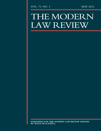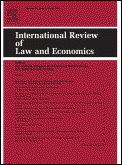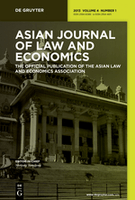
AMERICAN JOURNAL OF COMPARATIVE LAW
Scope & Guideline
Bridging Jurisdictions Through Comparative Insight
Introduction
Aims and Scopes
- Comparative Legal Analysis:
The journal emphasizes the comparative approach to studying laws from different jurisdictions, analyzing similarities and differences to enrich understanding and application of legal principles. - Interdisciplinary Perspectives:
It seeks to integrate insights from various disciplines, including political science, sociology, and economics, to provide a comprehensive view of law and its impact on society. - Focus on Global Legal Developments:
The journal covers legal developments around the globe, highlighting how local laws interact with international norms and the effects of globalization on legal systems. - Historical Contextualization:
It values historical analysis of legal systems, examining the evolution of laws and legal practices over time to understand current legal frameworks better. - Emerging Legal Trends:
The journal is dedicated to identifying and discussing emerging trends in law, including new legal theories and practices that arise as societies evolve.
Trending and Emerging
- Judicial Behavior and Cross-Citations:
Recent articles emphasize the analysis of judicial behavior and cross-citations among judges, indicating a growing interest in how judges engage with foreign case law and the implications for legal uniformity and divergence. - Gender and Law:
There is an emerging focus on gender-related legal issues, particularly how laws affect women and marginalized groups, reflecting broader societal conversations about equality and justice. - Transnational Legal Issues:
The journal increasingly addresses transnational legal issues, exploring how local laws interact with global standards, especially in areas like corporate governance and human rights. - Digital and Technological Impacts on Law:
Emerging themes related to the impacts of technology on legal frameworks, including discussions on artificial intelligence, cryptocurrencies, and the legal metaverse, reflect the journal's engagement with contemporary legal challenges. - Environmental Law and Sustainability:
There is a notable increase in articles focusing on environmental law and its intersection with comparative law, highlighting the importance of sustainability in legal discourse.
Declining or Waning
- Traditional International Law:
There seems to be a reduction in the frequency of papers solely focused on traditional international law topics, possibly overshadowed by more contemporary issues such as human rights and transnational legal practices. - Colonial Legal Histories:
Interest in colonial legal histories appears to be waning, with fewer articles dedicated to exploring the implications of colonial law on current legal systems, possibly due to a shift towards more modern comparative frameworks. - Static Legal Doctrines:
The examination of static legal doctrines with little comparative analysis is less prevalent, indicating a trend towards dynamic and evolving legal interpretations rather than a focus on established norms. - Comparative Law as a Standalone Discipline:
There is a decreasing tendency to view comparative law as a standalone discipline, with more emphasis now on its integration with other legal and social sciences.
Similar Journals

SYDNEY LAW REVIEW
Unpacking the Complexities of Legal FrameworksSYDNEY LAW REVIEW is a prestigious academic journal published by the Sydney Law School, dedicated to the field of legal studies and interdisciplinary analysis of law and its impact on society. With its ISSN 0082-0512 and E-ISSN 1444-9528, this journal serves as a vital resource for legal scholars, researchers, and practitioners in Australia and globally. The journal has undergone several phases since its inception in 1990, reflecting the evolving landscape of legal scholarship and policy. Although currently not an open-access publication, it remains a significant contributor to legal discourse, maintaining a Q4 ranking in the Law category as per the 2023 category quartiles. The SYDNEY LAW REVIEW encourages submissions that critically explore contemporary legal issues, thereby fostering a robust platform for academic inquiry and professional advancement.

COLUMBIA JOURNAL OF TRANSNATIONAL LAW
Connecting Scholars to Global Legal Issues.The COLUMBIA JOURNAL OF TRANSNATIONAL LAW, published by the COLUMBIA JOURNAL TRANSNATIONAL LAW ASSOCIATION, stands as a premier academic platform in the fields of Law, Political Science, and International Relations. Having maintained a commendable Q2 ranking in both law and political science categories for 2023, it represents a vital resource for scholars and practitioners alike in navigating the complexities of transnational legal issues from 1996 to 2024. Situated in the U.S. at the esteemed Columbia University School of Law, the journal not only meets the rigorous academic standards but also addresses pressing global challenges through interdisciplinary research. Although it does not currently offer open access options, its commitment to providing insightful analyses and fostering robust scholarly dialogue in a rapidly changing world remains paramount. With its inclusion in reputable databases like Scopus, the journal is poised to impact the academic landscape significantly, catering to both emerging and established voices in transnational law.

Jurnal Cita Hukum-Indonesian Law Journal
Exploring the Depths of Indonesian Law.Jurnal Cita Hukum-Indonesian Law Journal, with ISSN 2356-1440 and E-ISSN 2502-230X, is a prestigious open-access journal published by UNIV ISLAM NEGERI SYARIF HIDAYATULLAH JAKARTA. Since its inception in 2013, this journal has become a critical platform for the dissemination of legal scholarship in Indonesia, addressing crucial topics in Indonesian law and its applications within the broader Southeast Asian context. The journal's commitment to accessibility ensures that research findings are readily available to a wide audience, promoting knowledge-sharing among researchers, legal professionals, and students alike. As it continues to forge new avenues of inquiry in legal studies, Jurnal Cita Hukum plays a significant role in enhancing the understanding and development of law in Indonesia, making it an invaluable resource for those committed to advancing legal scholarship and practice.

Revista General de Derecho Romano
Illuminating the Past to Inform the Future of LawRevista General de Derecho Romano is a prominent academic journal dedicated to the study and analysis of Roman law and its contemporary implications. Published by IUSTEL, this journal serves as a vital resource for researchers, practitioners, and students interested in the development of legal doctrines, historical perspectives, and comparative analyses rooted in Roman legal tradition. The journal's ISSN 1697-3046 ensures its accessibility and recognition within academic circles. Although it operates under a traditional publishing model, the journal emphasizes high-quality, peer-reviewed articles that contribute significantly to the field, fostering a deeper understanding of how ancient legal principles can inform modern legal systems. With an aim to bridge historical context with current legal discourse, the Revista General de Derecho Romano is essential for anyone seeking to enhance their knowledge and expertise in this specialized area of law.

MODERN LAW REVIEW
Shaping the Future of Law Through Insightful Discourse.MODERN LAW REVIEW, a prestigious academic journal published by Wiley, stands as a significant platform in the field of law, dedicated to exploring contemporary legal issues and fostering scholarly discourse since its inception in 1937. With an impressive Scopus Rank of #237 out of 1025 in the Social Sciences - Law category, placing it in the 76th percentile, the journal has consistently maintained a reputation for high-quality research, currently positioned in Q2 of the category quartiles as of 2023. The journal's comprehensive coverage spans various legal topics, making it essential reading for legal scholars, practitioners, and students alike. Although it is not an open-access journal, its contributions are invaluable for guiding the future of legal scholarship. With a robust history of converged years from 1995, 1997 to 1999, 2001 to 2002, 2004, and 2011 to 2024, MODERN LAW REVIEW remains at the forefront of legal research, addressing pressing issues and influencing legal thought across disciplines.

INTERNATIONAL REVIEW OF LAW AND ECONOMICS
Illuminating the Nexus of Law and Economic Analysis.The INTERNATIONAL REVIEW OF LAW AND ECONOMICS, published by Elsevier Science Inc, stands as a premier academic journal dedicated to the interdisciplinary exploration of law and economics since its inception in 1981. With an impressive convergence of insightful research and theoretical advancement, the journal encapsulates critical findings that bridge legal studies and economic principles. Ranked in the Q2 category for Economics and Econometrics and Finance, alongside a notable Q1 ranking in Law, it highlights its significant influence and high-quality scholarship within the academic community. The journal is indexed in Scopus, achieving commendable rankings which reflect its importance, ranking #188 out of 1025 in Law and #343 out of 716 in Economics and Econometrics. With no Open Access option specified, readers are encouraged to engage with the content through institutional access or subscription. This journal is essential reading for researchers, practitioners, and scholars looking to deepen their understanding of how legal frameworks intersect with economic theories, making it a vital resource in both fields.

Comparative Legal History
Decoding Legal Traditions Through Historical Lenses.Comparative Legal History is a premier scholarly journal published by Routledge Journals, Taylor & Francis Ltd, dedicated to advancing the understanding of legal systems through the lens of historical analysis. With an impressive impact factor reflecting its academic rigor, this journal has established itself as a vital resource for researchers, professionals, and students alike who seek to explore the intersections of law and history. The journal is ranked in the Q1 category in History and Q2 in Law, demonstrating its quality and relevance in these fields. Covering a wide array of subjects related to comparative legal studies from its inception in 2013, the journal publishes original research, critical essays, and discussions on historical legal practices and their contemporary implications. Comparative Legal History provides a unique platform for interdisciplinary scholarship, contributing significantly to the academic discourse in both history and law, making it an essential publication for anyone involved in these disciplines.

Asian Journal of Law and Economics
Fostering Interdisciplinary Understanding in Law and Economics.Asian Journal of Law and Economics, published by Walter de Gruyter GmbH, operates at the intersection of the law and economics disciplines, offering a unique platform for scholarly discourse since its inception in 2010. With an ISSN of 2194-6086 and an E-ISSN of 2154-4611, this journal has established itself as a reputable source of innovative research, achieving a Q2 quartile ranking in both the fields of Economics and Law as of 2023. The journal aims to provide critical insights into how legal frameworks interact with economic theories, making it an essential resource for researchers, practitioners, and students alike. Additionally, it boasts a respectable ranking within Scopus, reflecting its significance in social sciences, particularly within law and economics. The journal's commitment to fostering a deeper understanding of global legal and economic issues makes it a pivotal read for those engaged in interdisciplinary studies.

Review of Central and East European Law
Contributing to the Legacy of Legal Scholarship Since 1975The Review of Central and East European Law, published by Martinus Nijhoff Publishers, stands as a pivotal academic journal dedicated to the legal developments and scholarly discourse in Central and Eastern Europe. With an ISSN of 0925-9880, this journal has been at the forefront of law and legal studies since its inception in 1975, becoming an essential resource for researchers, professionals, and students alike. The journal offers a rich interdisciplinary approach by integrating perspectives from classics, history, law, and philosophy, as evidenced by its classification across various quartile rankings. Specifically, it holds a prestigious Q2 ranking in Classics and is recognized within the upper echelons of History and Philosophy disciplines. With an accessible focus and insights into the evolving legal landscape, the Review of Central and East European Law continues to contribute significantly to understanding legal frameworks and practices in this dynamic region, ensuring its relevance in academic and professional circles.

Cambridge Law Journal
Fostering Innovation in Legal Theory and PracticeCambridge Law Journal, a prominent publication in the field of law, has made significant contributions to legal scholarship since its inception in 1921. Published by Cambridge University Press, this esteemed journal provides a critical platform for advancing discussions on contemporary legal issues, theories, and practices. With a 2023 Scopus ranking placing it in the top 42% of law journals globally, it maintains a Q2 categorization reflecting its academic rigor and relevance. Although open access options are not available, the journal remains accessible to a broad audience through university libraries and academic networks. The coverage of scholarly articles from the past to the present, specifically from the years 1921 to 1939, 1941 to 1998, and 2000 to 2024, ensures that researchers, professionals, and students can explore a rich trove of legal knowledge and perspectives. Engaging with the Cambridge Law Journal not only enables scholars to stay abreast of the latest developments in legal thought but also inspires innovative approaches to understanding and addressing legal challenges in today's complex world.